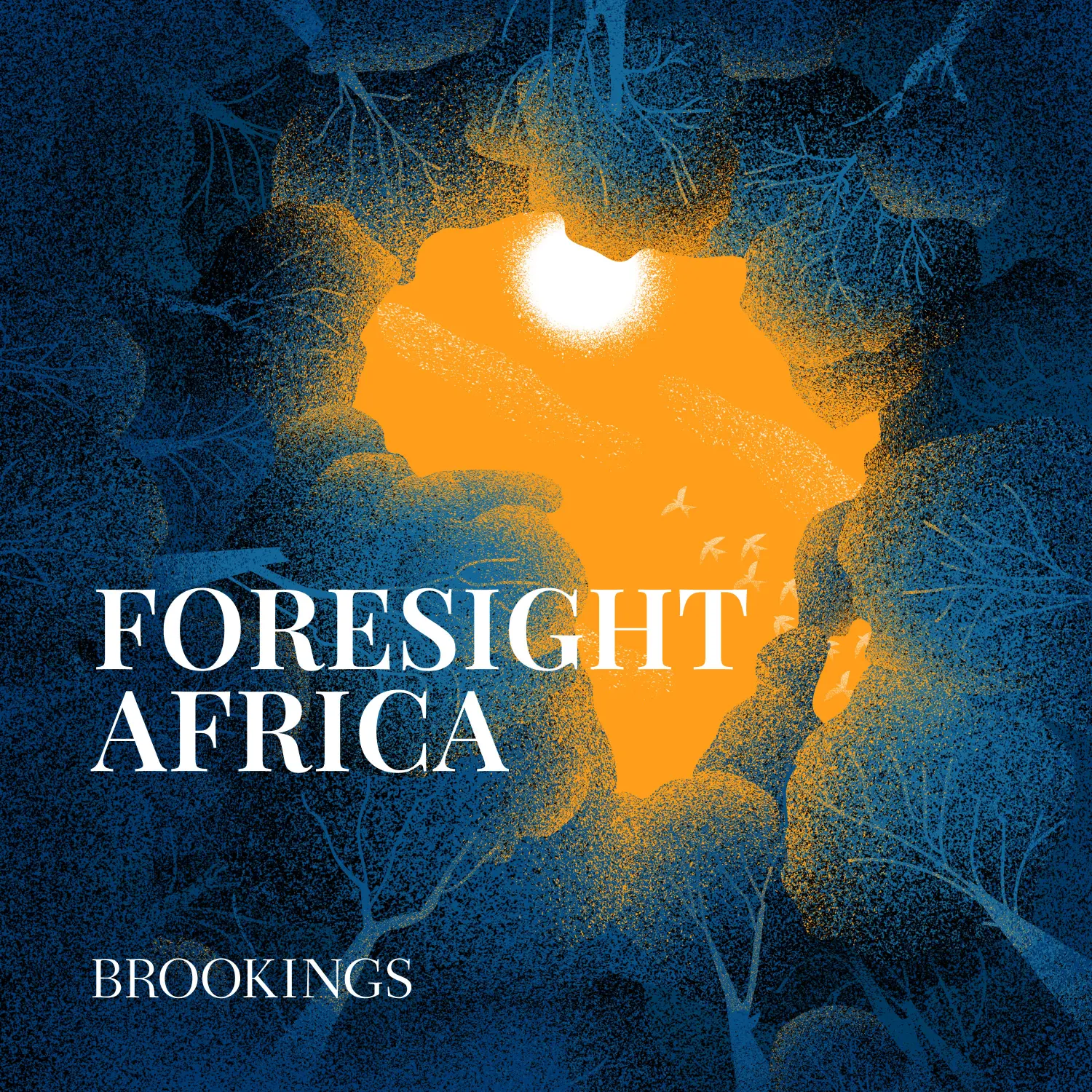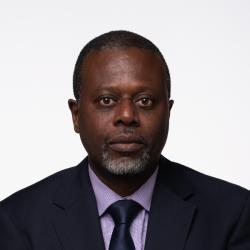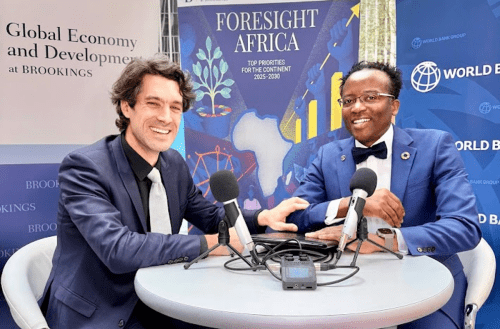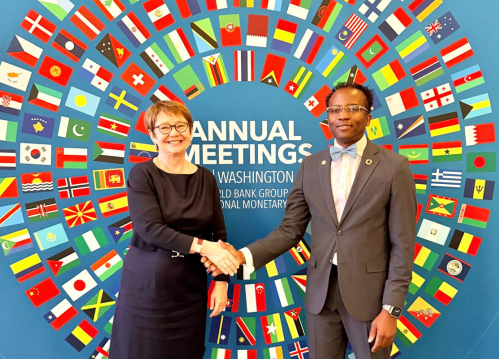From October 13-18, the World Bank and International Monetary Fund hosted their 2025 Annual meetings, gathering prominent figures in development finance from around the world. Foresight Africa was on the scene throughout the week to speak to some of these influential leaders making and shaping policy throughout the world.
In this interview, host Landry Signé speaks with Dr. Amadou Sy, Assistant Director at the IMF’s Africa Department about this year’s Regional Economic Outlook. Dr. Sy describes how African countries are demonstrating resilience despite global economic uncertainties but still need bold action to get the levels of growth needed for development. Prior to joining the IMF, Dr. Sy was previously Director of the Brookings Institution’s Africa Growth Initiative.
Transcript
LANDRY SIGNÉ: Hello, I am Landry Signé, a senior fellow at the Global Economy and Development Program and the Africa Growth Initiative at the Brookings Institution. Welcome to the Foresight Africa Podcast, where I engage with distinguished leaders in policy, business, academia, and civil society to share unique insights and innovative solutions to Africa’s challenges. While highlighting opportunities to advance engagement between Africa and the global community.
Today, we are fortunate to be meeting on the sidelines of the World Bank and International Monetary Fund’s Annual Meetings, a yearly gathering of the world’s most prominent figures in the development finance space, including central bankers, ministers of finance, heads of global and regional financial institutions, corporate CEOs, entrepreneurs, and civil society leaders.
Welcome to the Brookings Institution’s Foresight Africa Podcast Show!
AMADOU SY: Thank you.
LANDRY SIGNÉ: Before we begin, could you please state your full name and title for the recording first?
AMADOU SY: Thanks for having me, Landry. My name is Amadou Sy and I’m an Assistant Director at the IMFs African Department and I work on the Regional Economic Outlook.
LANDRY SIGNÉ: I am delighted to have you join me during this very busy week, and I truly appreciate you taking the time to share your unique insights with our audience.
AMADOU SY: Thanks for having me.
LANDRY SIGNÉ: As you take part in this year’s annual meetings which priorities do you see as most essential for driving sustainable and inclusive growth, and why?
AMADOU SY: Thanks Landry. I think the IMFs managing director during her curtain razor had a very good summary, really of the priorities that the global economy faces. And I think first we should start with some context. Maybe three points of context.
First: uncertainty has increased. Two: the global economy has fared better than we feared, but worse than we need. And finally: resilience. We’ve really witnessed a resilience from the global economy, including from African countries and maybe there four issues.
We’ve seen many countries have improved policy fundamentals. And I can later elaborate on that. We’ve seen more adaptability from the private sector. We’ve seen also less severe tariff outcomes, US tariff outcomes, we didn’t have a trade war. And finally, we are seeing increasingly supportive financial conditions.
However, global resilience has not yet fully been tested. We see some signs, for example, the global demand for gold, which is surging the price of gold. Last time we checked from 2022 to now has more than doubled. Finance and in terms of financial conditions, although they are supportive, you know that they are also susceptible to these boom-and-bust cycles.
LANDRY SIGNÉ: Absolutely.
AMADOU SY: Against this context, to come back to your question about which priorities do we see the most I think in the medium terms, we can see three clear policy goals. One is that there is a need to lift growth. This is true for the global economy. Global growth is being forecasted at 3%, lower than the 3.7% that we expected, but in Africa it’s 4.1% in 2025, and it’s forecasted to 4.4% in 2026. But as a per capita growth, this is still insufficient to really meet the challenges of the continent. Second. We need to repair government finances so that we can buffer new shocks.
And finally for some parts of the global economy, there’s a need to look at excessive imbalances and address them.
LANDRY SIGNÉ: Fantastic, Amadou. What insights or lessons from these discussions or from your overall work should global leaders act on to strengthen resiliency and address today’s most pressing economic and social challenges?
AMADOU SY: Yes. If I may, I will take an African hat to answer this question.
LANDRY SIGNÉ: Absolutely.
AMADOU SY: Although your question is about global leaders, I will just focus a little bit on Africa. As you see, we can see less official development aid from the global community. We can see still. Some uncertainty on the tariff side, we know that AGOA has expired at the end of the month of September.
We hope that it will be reinstated. But maybe a few points from the point of view of Africa. I think it’s important to realize that the region is far from powerless and policy makers as it was the case for global leaders should prioritize efforts to boost resiliency, ensure macroeconomic stability and accelerate structural reforms. You’ve heard that before from the IMF, but it is still a very timely and relevant policy advice. Second. Although unlike global debt and richer countries’ debt, median debt in Africa is actually going down. The problem is the cost of debt is very high and it’s crowding out much needed development expenditures, development spending.
So this coupled with lower ODA means that the fiscal front is the way the one where our African policy makers should focus. Some countries still need further consolidation to reduce their vulnerabilities and put their public finances in a sure footing. So one issue though that we wanted to flag is that as countries are relying more on domestic markets, borrow more domestically because their investor base is not very broad, the.
Domestic banks are the one mopping up most of that debt. Absolutely. And that raises a sovereign bank nexus, which comes with some risks, which need to be measured, which need to be identified. Because we have some ideas about how to broaden the investor base, get more the pension insurance system maybe if needed allow for investors to come in, but also by managing the risks.
But these are two issues. And finally, I would say that in terms of the monetary policy, always the advice is to be data driven. Monetary policy should be data driven for countries where inflation remains high keeping a tight monetary stance if needed would be warranted.
And finally, the region still needs. Significant investments in education, health, and infrastructure, and domestic efforts to have, will have to be supported by international partners. And I will come back maybe later to the role of the private sector in this
LANDRY SIGNÉ: Fantastic Amadou. I really like how you are providing comprehensive perspectives to the question. The African Department has just released its Regional Economic Outlook for Sub-Saharan Africa. What are the takeaways from this extremely important report?
AMADOU SY: Yes. Maybe three points there. First is that the region, Sub-Saharan Africa, has demonstrated resilience amid a very tough external backdrop.
So we have resilient growth outlook. Some of the fastest growing countries in the world will come from Africa. For the region as a whole, we expect a modest pickup in 2026 from 4.1% to 4.4% this year in 2025. However, fragile countries and natural resource rich countries will continue to face headwinds.
And this resilient growth outlook is despite a challenging external environment. We’ve mentioned uncertainty in the global trade, official development aid that has gone down. We’ve seen some signs in the Eurobond market, which has reopened. Some markets were able to tap the Eurobond market in the first quarter of 2025, and we haven’t seen anything until September with Kenya and Angola issuing. Kenya with $1.5 billion, Angola with $1.75 billion.
Our advice is yes; the window is open. Use it for debt management purposes use it adequately because we have this boom-and-bust cycle for the financial sector. Then we have what we could call these overlapping vulnerabilities. So some countries will combine a high debt service with some issues with high inflation and low reserves.
Still about a fifth of the region has inflation higher than 10%. You can think about Angola, Nigeria. Then we have one third of our region which has reserves less than three months. So these overlapping vulnerabilities have to be really watched carefully.
I can go into the policy priorities if you want, but these are the main stylized facts that we have seen for the region.
LANDRY SIGNÉ: Insightful, Amadou. You mentioned some of the policy priorities that you can bring. Perhaps to that question, what bold actionable ideas from this week or from the report do you see shaping global policy and practice? And how do you plan to translate them into tangible results or to support countries turning them into tangible results?
AMADOU SY: So before I move into the specific policy recommendations – not only in Africa, but also in Asia, we’ve seen this Gen Z movement.
We’ve seen Madagascar we’ve seen Morocco, we’ve seen Nepal, Sri Lanka, Indonesia, Bangladesh. You’ve mentioned the word bold, so why I started with that: policy makers, in order to take these bold actions that they need, will really have to communicate very clearly explain the trade-offs, consult with stakeholders. This is difficult, this is challenging. That’s why I started with that. Once you have agency from all these stakeholders. Then it becomes maybe less challenging to go into bold actions. But bold actions are needed.
Especially if you look at the GDP per capita growth. African countries are growing fast, but we need a faster GDP per capita growth. So again, two main issues where we focus this time in our report. And then we’ll have another report in the spring, in April, which will go into other issues like structural reforms.
But this time what we chose to do is consult with our teams that provide technical assistance. Consult with the stakeholders and come up with more, as you say, tangible examples of what to do. So one is mobilizing domestic revenue and second is improving debt management. So just very quickly, one tangible aspect is leveraging technology, digitalization, in tax policy and in tax administration. And when it comes to improving debt management, again, enhancing that transparency to lower borrowing costs and mitigate fiscal risk. So we the report goes into more detail.
We also have some preliminary thinking about innovative financing instruments. We’ve seen some examples, and the idea is how do you bring that to scale? Like for Côte d’Ivoire, for example some interest working with the World Bank some debt for development swaps and so on.
LANDRY SIGNÉ: Absolutely, yeah. That is fantastic. What a beautiful way to conclude. Amadou, thank you so much for joining me today.
AMADOU SY: No, thank you for having me, Landry.
-
Acknowledgements and disclosures
The Foresight Africa podcast is brought to you by the Brookings Podcast Network. Send your feedback and questions to [email protected]. Special thanks to the production team including Fred Dews, producer; Dafe Oputu, and Nicole Ntungire, associate producers; Gastón Reboredo, audio engineer; and Izzy Taylor, communications manager in Brookings Global. The show’s art was designed by Shavanthi Mendis. Additional promotional support for this podcast comes from my colleagues in Brookings Global and the Office of Communications at Brookings.
The Brookings Institution is committed to quality, independence, and impact.
We are supported by a diverse array of funders. In line with our values and policies, each Brookings publication represents the sole views of its author(s).







Commentary
PodcastBrookings AGI at the Annual Meetings: The IMF on managing risks and opportunities for Africa’s economic growth
November 19, 2025
Listen on
Foresight Africa Podcast